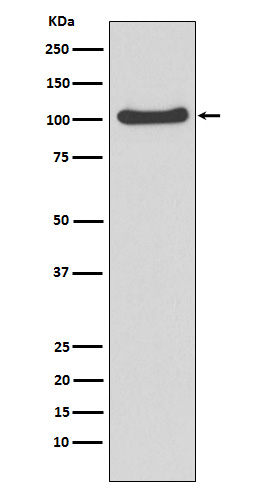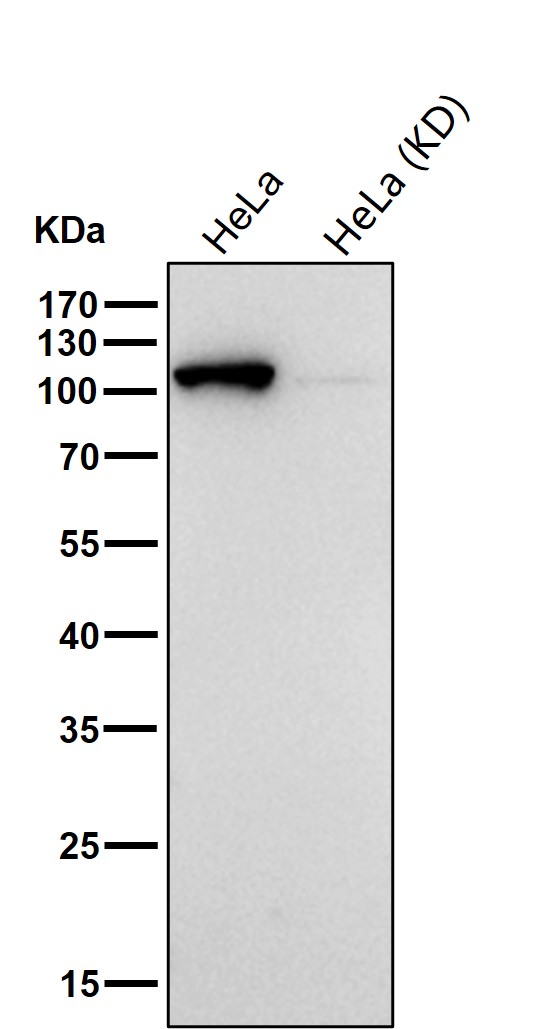

| WB | 咨询技术 | Human,Mouse,Rat |
| IF | 咨询技术 | Human,Mouse,Rat |
| IHC | 1/100-1/200 | Human,Mouse,Rat |
| ICC | 技术咨询 | Human,Mouse,Rat |
| FCM | 咨询技术 | Human,Mouse,Rat |
| Elisa | 咨询技术 | Human,Mouse,Rat |
| Aliases | LRP; MVP; VAULT1;;MVP |
| WB Predicted band size | 99 kDa |
| Host/Isotype | Rabbit IgG |
| Antibody Type | Primary antibody |
| Storage | Store at 4°C short term. Aliquot and store at -20°C long term. Avoid freeze/thaw cycles. |
| Species Reactivity | Human,Mouse,Rat |
| Immunogen | A synthesized peptide derived from human MVP |
| Formulation | Purified antibody in PBS with 0.05% sodium azide,0.05% BSA and 50% glycerol. |
+ +
以下是3-4条关于 **MVP抗体(Major Vault Protein抗体)** 的参考文献及简要摘要:
---
1. **文献名称**: *Major vault protein is a novel substrate for the tyrosine phosphatase SHP-2 and participates in oxidative stress response*
**作者**: Sumitomo, A., et al.
**摘要**: 研究揭示了MVP在氧化应激反应中的作用,通过SHP-2酪氨酸磷酸酶调控其功能。实验表明MVP抗体在检测细胞氧化应激中MVP磷酸化水平的关键作用,为MVP在细胞应激信号通路中的机制提供了新见解。
---
2. **文献名称**: *The major vault protein mediates resistance to epidermal growth factor receptor inhibition in human hepatoma cells*
**作者**: Chen, Z., et al.
**摘要**: 该文献探讨了MVP在肝癌细胞中对EGFR抑制剂耐药性的影响。通过MVP抗体进行免疫沉淀和Western blot分析,发现MVP过表达通过激活PI3K/AKT通路促进耐药性,提示其作为潜在治疗靶点。
---
3. **文献名称**: *Vault proteins and the immune system: Identification of tumor-associated vault peptides in colon cancer*
**作者**: Kuiperij, H.B., et al.
**摘要**: 研究利用MVP抗体在结肠癌组织中发现肿瘤特异性穹隆体蛋白(MVP)肽段,揭示其在肿瘤免疫逃逸中的作用,为MVP作为癌症免疫治疗的生物标志物提供了依据。
---
4. **文献名称**: *Major vault protein promotes hepatocellular carcinoma through targeting interferon signaling*
**作者**: Wang, X., et al.
**摘要**: 通过MVP抗体敲低实验,证明MVP通过抑制干扰素信号通路促进肝癌进展,为MVP在肝癌发生中的分子机制及其作为预后标志物的潜力提供了证据。
---
以上文献均聚焦于MVP蛋白的功能机制及其抗体在实验中的应用,涵盖癌症耐药、免疫调控及信号通路等领域。如需具体文献链接或补充其他方向,可进一步说明。
**Background of MVP Antibodies**
Major Vault Protein (MVP), also known as LRP56. is the primary component of vaults—large cytoplasmic ribonucleoprotein particles conserved across eukaryotes. Vaults are implicated in diverse cellular processes, including intracellular transport, signaling, and drug resistance. MVP antibodies are essential tools for studying vault structure, function, and their association with diseases, particularly cancer.
MVP gained attention due to its overexpression in multidrug-resistant (MDR) cancer cells, where it is linked to the efflux of chemotherapeutic agents, contributing to treatment failure. Research suggests MVP interacts with pathways like PI3K/AKT and NF-κB, influencing cell survival and stress responses. Its role in exosome-mediated communication and immune modulation further underscores its biomedical relevance.
Antibodies targeting MVP enable detection of its expression levels in tissues or cell lines, aiding in correlating MVP abundance with clinical outcomes (e.g., poor prognosis in colorectal or ovarian cancers). Different MVP antibody clones (e.g., clone 219) are validated for techniques like Western blotting, immunohistochemistry, or immunofluorescence, with specificity confirmed through knockout controls.
Despite progress, MVP's precise mechanistic roles remain debated, driving ongoing research. MVP antibodies thus serve as critical reagents for unraveling vault-related biology and exploring therapeutic strategies to counteract MVP-mediated drug resistance in oncology.
×